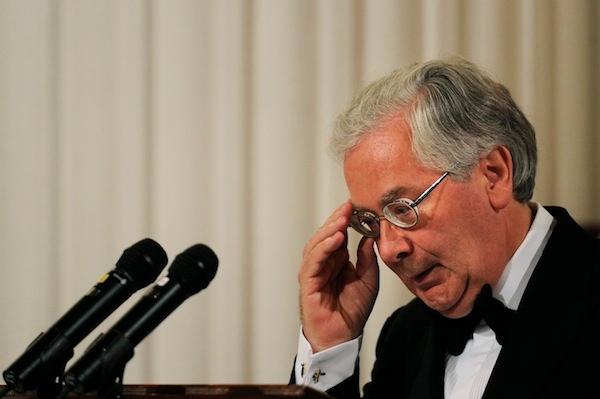Listening to Mervyn King and his Bank of England deputy Paul Tucker over the past few days, you’d have thought they only found out about Libor manipulation with the rest of us, three weeks ago. Appearing before the Treasury Select Committee this morning, King stated that ‘the first I knew of any alleged wrongdoing was when the report came out two weeks ago’. But documents from the New York Federal Reserve, made public as part of the US Congress’s investigation, suggest that US authorities did know, and tried to warn the Bank of England that manipulation was going on.
First, the transcript of a phone call on 11 April 2008 between a Barclays employee and a NY Fed analyst. The Barclays employee revealed that Barclays ‘know that we’re not posting, um, an honest Libor’, and that they were doing it to combat speculation that they had ‘had a problem raising cash in the interbank market’. And he suggested that other banks were at it too, saying:
‘Barclays Bank would definitely be in with all the prime banks there, and we’re not unusual in any way. If we can’t borrow money at that rate then no one else could really.’
Second, we have an internal memo from the NY Fed reporting that:
‘Contacts at Libor contributing banks have indicated a tendency to under-report actual borrowing costs when reporting to the BBA in order to limit the potential for speculation about the institutions’ liquidity problems.’
The NY Fed’s President, Tim Geithner (now Obama’s Treasury Secretary) communicated these concerns to the Bank of England, in an email to King (cc-d to Tucker). He suggests changes to Libor to enhance its credibility, including expanding the panel of banks from which rates are collected, and randomly selecting 16 each time to produce the average. This would, he says, ‘lessen the likelihood that the market would draw a negative inference regarding a particular bank’s continues absence from the list of published quotes’. The obvious reason for this recommendation is to remove the incentive for banks to deliberately report lower rates than they’re actually borrowing at.
King replied, saying that Geithner’s suggestions ‘seem sensible to us’ and that he would pass them on to the British Bankers’ Association, the organisation responsible for setting Libor.
So how can King and Tucker still claim that they had know knowledge that deliberate manipulation was going on? When brought up on this by Michael Fallon at this morning’s select committee hearing, King said that the NY Fed’s internal memo ‘was never shared with us’ and that he took Geithner’s suggestions as ways to prevent such manipulation in the future, but did not take them to mean that Geithner thought manipulation was already happening. Tucker’s favourite phrase this morning was that nothing ‘set alarm bells ringing’ at the time, while King turned the focus elsewhere. ‘That is the regulator’s job’, he repeated over and over.






Comments